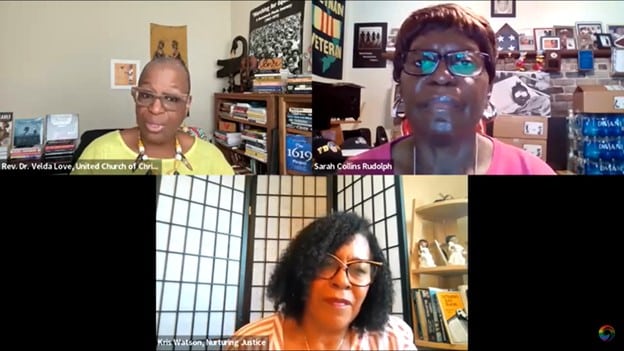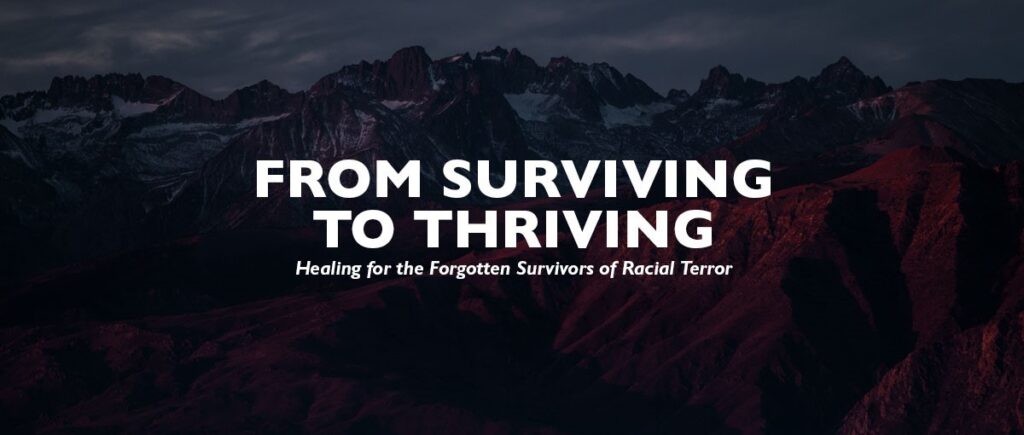Grief, healing, hope: Join the Movement honors 60th anniversary of Birmingham church bombing
On Sept. 15, 1963, a bomb was detonated at the 16th Street Baptist Church in Birmingham, Ala., by four members of the Ku Klux Klan.
Now, 60 years later, the United Church of Christ’s Join the Movement Toward Racial Justice and Nurturing Justice co-hosted a virtual symposium — “From Surviving to Thriving: Healing for the Forgotten Survivors of Racial Terror” — on Sept. 15 to commemorate the anniversary. The bombing took the lives of four children who were attending Sunday School services at the church: Addie Mae Collins, Denise McNair, Carole Robertson and Cynthia Wesley.
Sarah Collins Rudolph, a fifth child who was present in the church that day and survived, shared her story at the online gathering.
The event’s co-hosts — the Rev. Velda Love and the Rev. Kris Watson, who each head the respective sponsoring organizations — interviewed Collins Rudolph and offered an ongoing invitation to donate to a fund for her as an act of community-based restorative justice. Collins Rudolph experienced significant medical needs alongside the traumatic experience of the bombing and has not received support from the state of Alabama.
‘Divine thriving and resilience’
Watson acknowledged that many people remain unaware of Collins Rudolph.
“The ‘powers that be’ designed a plot to squash her from our memories. And it’s our responsibility to refresh our memories and celebrate our resilience and her resilience,” she said. “It’s a story of more than survival. It’s a story of divine thriving and resilience against all odds in a world that is still filled with racial violence, terror and hate.”
Collins Rudolph shared fond memories of playing with her sister Addie, whose life was lost in the bombing. She spoke about this trauma that she experienced as a 12-year-old and how she was unable to talk about it for decades.
Now, she is committed to sharing her story.
“I’m going to keep telling my story. If they had to wheel me in, I’d be still talking about it,” she said. “This is something that young people need to know. They didn’t get these rights handed to them — we had to fight for the rights that we have now.”
“[Sarah’s] journey stays with us. Her life matters. Her story matters. The book that she has written and shared with us matters,” said Love. “I am encouraged by not just her words. But that God has seen fit that she remains a witness and that we are listening to her voice.”
Grief, healing, hope
The “From Surviving to Thriving” event included a worship service with space for grieving and prayers for healing conveyed through song, readings and anointing.
In the event’s plenary discussion, the Rev. Jacqui Lewis, senior minister of Middle Collegiate Church in New York City, and the Rev. Willie Dwayne Francois III, senior pastor of Mount Zion Baptist Church in Pleasantville, N.J., and associate professor of liberation theology at New York Theological Seminary, spoke meaningfully about Collins Rudolph’s story within a broader history of racial violence in the United States.

“There’s something about the racial terror that many of our ancestors, our sisters and our brothers survived and thrived through that gives us so much of the democracy that it’s so easy for us to take for granted,” Francois said. “As I listen to Mrs. Sarah, I’m reminded that there is no such thing as a bloodless revolution in the United States. Yes, it was this nonviolent movement that helped to prick the conscience, but that nonviolence wouldn’t have been seen or underscored without Black death.”
Lewis addressed the importance of acknowledging the prevalence and violent impact of white supremacy.
“To acknowledge that we have been broken by this nation’s disregard for Blackness and its disregard for female bodies is the beginning of healing,” she said. “But on the way to fully thriving and surviving, we have to admit that we’re broken. And we have to admit that our bodies deserve some attention and some time and our souls deserve some nourishing and some rest and some play and some dance, so that what has been wrought upon us, we don’t keep duplicating.”
‘Ongoing, ever-evolving’
The conversations they began were continued in a series of afternoon workshops that addressed issues of combatting U.S. nationalism, healing intergenerational trauma and community organizing against racial terror.
These were led by additional faith leaders: the Rev. Danielle Buhuro, executive director of Sankofa CPE Center; Obery Hendricks Jr., a lifelong social activist and influential African American biblical scholar; and Bishop Dwayne Royster, senior pastor of Faith United Church of Christ in Washington, D.C., and national political director of Faith in Action.
The event’s hosts wrapped up the plenary session with words of encouragement.
“This is an ongoing, ever-evolving effort for us to be able to come together and to learn from one another how to do this work in excellence,” Watson said.
“As we move from this place into the very presence of the spirit of the living God, we are radical vision,” said Love. “We are the movement that the creator sought from the very beginning. We are not accidents. We are here because God has given us within our DNA the survival and the thriving. Remember that you are beloved, that these words are for healing, that God is still with us, that we will never be alone, and that we will stand until the day freedom and justice ring true.”
The full recording of the plenary session is available here.
Content on ucc.org is copyrighted by the National Setting of the United Church of Christ and may be only shared according to the guidelines outlined here.
Related News
A Prophetic Call for Justice and Peace in Palestine
The executive leaders of the United Church of Christ have issued the following statement...
Read More‘Love is Greater Than Fear’: Regional Youth Events get to the heart of gospel message
United Church of Christ teens attending this summer’s Regional Youth Events (RYE) are...
Read MoreUCC desk calendars available to order now
Prepare for your day, month and year with the United Church of Christ desk calendar —...
Read More


